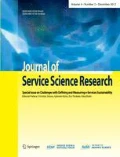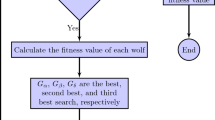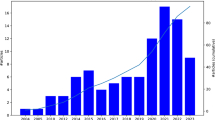Abstract
Typically, the service quality in the hotel industry is analyzed using cross-sectional empirical studies. For example, to examine current causal relationships among various latent and manifest variables using structural equation modeling plays a key role in understanding how services are provided at a given hotel. Note that accurate prediction of service quality certainly helps decision-makers better manage their services operations to sustain quality services to meet the ever-changing needs of customers. In this paper, by integrating continued fraction interpolation theory and genetic algorithms, an innovative service quality prediction model in the hotel industry is presented. An illustrative example is provided, which essentially shows the applicability of this proposed innovative methodology.
Similar content being viewed by others
References
Akbaba, A (2006) Measuring service quality in the hotel industry: a study in a business hotel in Turkey. International Journal of Hospitality Management 25:170–192.
Akbar S, Mat Som A, Wadood F, & Alzaidiyeen N (2010) Revitalization of service quality to gain customer satisfaction and loyalty. International Journal of Business and Management 5(6):113–122.
Badinelli R (2010) A stochastic model of resource allocation for service systems. Service Science 2(1/2):76–91.
Benitez J, Martin J, & Roman C (2004) Using fuzzy number for measuring quality of service in the hotel industry. Tourism Management 28:544–555.
Berry T (1991) Managing the Total Quality Transformation. McGraw-Hill, New York, NY.
Berry L, Bennet D, & Brown C (1989) Service Quality: A Profit Strategy for Financial Institutions. Dow-Jones-Irwin, Homewoord, IL.
Bollen K (1989) Structural Equations with Latent Variables. John Wiley & Sons, Inc.
Chapman J, Lovell G (2006) The competency model of hospitality service: Why it doesn’t deliver. International Journal of Contemporary Hospitality Management 18(1):78–88.
Chen K, Wang C (2005) Support vector regression with genetic algorithms in forecasting tourism demand. Tourism Management 28:215–226.
Cho V (2003) A Comparison of three different approaches to tourist arrival forecasting. Tourism Management 24:323–330.
Ekinci Y, Dawes P, & Massey G (2008) An extended model of the antecedents and consequences of consumer satisfaction for hospitability services. European Journal of Marketing 42(1/2):35–68.
Fernandez-Barcala M, Gonzalez-Diaz M, & Prieto-Rodriguez J (2009) Factors influencing guests hotel quality appraisals. European Journal of Tourism Research 2(1):25–40.
Frochot I, Hughes H (2000) Histoqual: the development of a historic houses assessment scale. Tourism Management 21:157–167.
Ghobadian A, Speller S, & Jones M (1994) Service quality: concepts and models. International Journal of Quality and Reliability Management 11(9):43–66.
Gracia E, Cifre E, & Grau R (2010) Service quality: The key role of service climate and service behavior of boundary employee units. Group and Organization Management 35(3):276–298.
Gronroos C (1984) A service quality model and its marketing implications. European Journal of Marketing 19(4):36–44.
Haydock R, Nex C, & Wexler G (2004) Vector continued fractions using a generalized inverse. Journal of Physics A: Mathematical and General 37:161–172.
Juwaheer T (2004) Exploring international tourists’ perceptions of hotel operations by using a modified SERVQUAL approach: A case study of Maurituius. Managing Service Quality 14(5):350–364.
Lin K, Chang C, Lin Z, Tseng M, & Lan L (2009) Application of experiential marketing strategy to identify factors affecting guests’ leisure behavior in Taiwan hot-spring hotel. WSEAS Transactions on Business and Economics 6(5):229–240.
Mei A, Dean A, & White C (1999) Analyzing service quality in the hospitality industry. Managing Service Quality 9(2):136–143.
O’Neill J, Mattila A (2004) Towards the development of a lodging service recovery strategy. Journal of Hospitality & Leisure Marketing 11(1):51–64.
Ottenbacher M, Gnoth J (2005) How to develop successful hospitality innovation. Cornell Hotel and Restaurant Administration Quarterly 46(2):205–222.
Qiu R, Fang Z, Shen H, & Yu M (2007) Editorial: towards service science, engineering and practice. International Journal of Services Operations and Informatics 2(2):103–113.
Qiu R (2009) Computational thinking of service systems: Dynamics and adaptiveness modeling. Service Science 1(1):42–55.
Qiu R (2010) A collaborative model of engineering education for complex global environments. 40th ASEE/IEEE Frontiers in Education Conference, Washington, DC, S3J1–6.
Roberts D (1999) On a representation of vector continued fractions. Journal of Computational and Applied Mathematics 105:453–466.
Stauss B, Weinlich B (1997) Process-oriented measurement of service quality: applying the sequential incident technique. European Journal of Marketing 31(1):33–55.
Tsang N, Qu H (2000) Service quality in China’s hotel industry: a perspective from tourists and hotel managers. International Journal of Contemporary Hospitality Management 12(5):316–326.
Tse E, Ho S (2009) Service quality in the hotel industry: When cultural contexts matter. Cornell Hotel and Restaurant Administration Quarterly 50(4):460–474.
Vargo S, Lusch R (2004) Evolving to a new dominant logic for marketing. Journal of Marketing 68:1–17.
Verma R, Plaschka G, & Louviere J (2002) Understanding customer choices: A key to successful management of hospitability services. Cornell Hotel and Restaurant Administration Quarterly 43(4):15–24.
Wang J, Liu S, & Qiu R (2008) Measurements of customer satisfaction based on service encounter. Group Economy 11:306–309.
Wang W, Wang J, & Qiu R (2010) The nonlinear effect of service standardization and customization on customer satisfaction. Journal of Service Science 2(1):1–23.
Whitley D (1994) A genetic algorithm tutorial. Statistics and Computing 4:65–85.
Wilkins H, Merrilees B, & Herington C (2006) Towards an understanding of hotel service quality in hotels. International Journal of Hospitality Management 26:840–853.
Yang C, Jou Y, & Cheng L (2009) Using integrated quality assessment for hotel service quality. Quality and Quantity 45(2):349–364.
Yang C, Wang C (2008) Two stages of case-based reasoning-Integrating genetic algorithm with data mining mechanism. Expert Systems with Applications 35:262–272.
Zeithaml V (2000) Service quality, profitability, and the economic worth of customers: What we know and what we need to learn. Journal of the Academy of Marketing Science 28(1):67–85.
Zeithaml V, Parasuraman A, & Berry L (1990) Delivering Quality Service: Balancing Customer Perceptions and Exceptions. The Free Press, New York, NY.
Author information
Authors and Affiliations
Corresponding author
Additional information
Robin G. Qiu is with Division of Engineering and Information Science at the Pennsylvania State University. Dr. Qiu currently serves as Advisory Editor of International Journal of Services Operations and Informatics and Editor-in-Chief of INFORMS Service Science, an associate editor of the IEEE Transactions on Systems, Man and Cybernetics, and is on the editorial boards of several other international journals. Dr. Qiu was an associate editor of IEEE Transactions on Industrial Informatics, the founder and General Chair of the 2005–2008 IEEE International Conference on Service Operations and Logistic, and Informatics, the founding and General Chair of 2009 INFORMS International Conference on Service Science. He was the founding chair of the Logistics and Services Technical Committee, Intelligent Transportation Systems Society, IEEE and the founding chair of Service Science Section of the INFORMS (the first of its kind-a worldwide Service Science organization). He has had over 100 peer-reviewed publications. His papers have appeared in IEEE Transactions on System, Man and Cyber-netics, IEEE Transactions on Semiconductor Manufacturing, Service Science, Decision Support Systems, Journal of Intelligent Manufacturing, International Journal of Production Economics, International Journal of Production Research, etc.
Zhengpeng Wu received his Ph.D. at Computational Mathematics, Institute of Computational Mathematics, and M.A. at Department of Statistics and Information, Nankai University. He works with Communication University of China. His research areas include grey system and service science.
Yan Yu has a master’s degree in Computer Science. She is now studying for Ph.D in Enterprise Management. Yan Yu is currently with Department of Computer Science, Southeast University, Nanjing, China. Her main research interests include social network analysis and data mining. She has published a book about J2EE and some related articles.
Rights and permissions
About this article
Cite this article
Qiu, R.G., Wu, Z. & Yu, Y. A tractable approximation approach to improving hotel service quality. J Serv Sci Res 3, 1–20 (2011). https://doi.org/10.1007/s12927-011-0001-y
Received:
Accepted:
Published:
Issue Date:
DOI: https://doi.org/10.1007/s12927-011-0001-y




